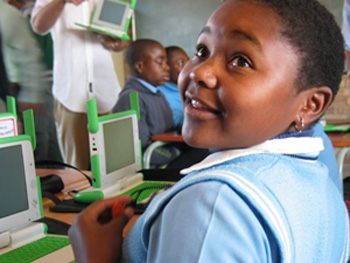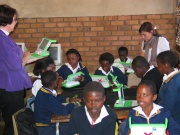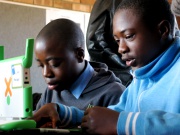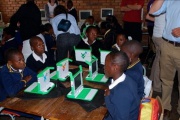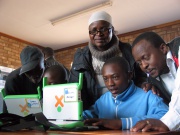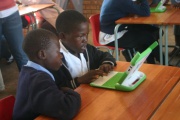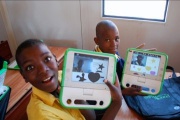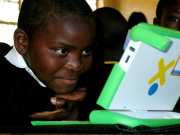OLPCorps IU South Africa
One Here...One There
One Here...One There (OHOT) is a non-profit organization driven to foster growth in sub-Saharan Africa through primary education - the best long term solution for ending the developing world's cycle of poverty, hunger, and disease. It's all about one here helping one there. Indiana University's chapter of OHOT was founded in 2006 in an effort to give students on IU's campus an opportunity to positively contribute to a pressing issue facing the world today. Indiana University's chapter of One Here... One There aims to give the youth of Haernertsburg, South Africa the opportunity to educate and empower themselves by providing them with XO laptops in hopes of closing the global educational disparity.
Members
| Name | Major | Class | '09 Team | |
|---|---|---|---|---|
| Savanah Franklin | International Studies & Economics | '09 | Yes | sabfrank@indiana.edu |
| Joe Peoni | Public Finance & Management | '10 | Yes | jpeoni@indiana.edu |
| Joe Delehanty | History, German & Economics | '09 | Yes | jdelehan@indiana.edu |
| Gordon Lang | Nursing | '12 | Yes | gorlang@indiana.edu |
| Carolyn Commons | International Studies | '12 | Yes | crcommons@gmail.com |
| Joseph Shikany | Business Marketing and Operations Management | '09 | Yes | josephshikany@gmail.com |
750 Word Draft Project Proposal
One Here...One There(OHOT) is a student organization dedicated to the proliferation of educational opportunities in sub-Saharan Africa. Our team is requesting $10,000 to distribute 100 laptops in Haenertsburg, a rural area in northern South Africa, in hopes of further saturating our current initiative. Our team has the experience and the contacts necessary to make this project a continued success.
Last summer, 12 members of OHOT (including four of our six current team members) raised over $60,000 to purchase three servers and 150 XO laptops through OLPC’s Give Many campaign. We worked alongside students in local primary schools for three weeks and created an open learning environment adaptable to their needs. Despite starting from the ground up, (how to type and use the mouse), at the end of three weeks our students were exploring the internet, learning new programs, and independently teaching their peers. The students’ excitement led to the development of an after-school program on Wednesdays that is managed by Stanford Lake College, a local secondary school.
Successful beyond our initial hopes and goals, the project allowed us to develop wonderful partnerships in the community. Thusanang Trust, a local non-profit organization, connected us with the schools, assisted with logistical needs, and sustains the project in our absence. Continued contact with Thusanang allows us to manage the project smoothly and address problems in a timely manner. Another ally, Kliptown Youth Program (KYP), specifically Neo Masilo and Sipho Dladla, provide us with ongoing technical support and will accompany us to the training in Kigali, Rwanda. In October, we funded an XO camp between the two existing OLPC deployments at KYP, where students were given the opportunity to master XO programs and increase their understanding of the internet. To learn more about our trip to South Africa, please visit South Africa or watch a short video documenting our project: IU OHOT Documentary
Before the Rwanda summit, we will be in Haenertsburg for three weeks assessing the changes and developments of the last deployment. One of our many initiatives is to address issues raised by South African primary students in problem profiles—multimedia presentations designed, developed, and produced by the students. In these profiles, students present issues that are most relevant and important to them, such as Water_at_Mmaweshi_Primary_School.pdf, Lack of Sports Facilities.pdf, and Erosion during rainfall.pdf. These fascinating portrayals opened our eyes to a greater level of understanding on the importance of meaningful project-based learning. By funding student-led projects, we aim to empower students to become agents of change.
Due to that fact that the children will be on break from June 26, to July 20, we will be implementing our project outside of the classroom. During the week after Rwanda, we will announce the project at the three schools and explain to the students the opportunities they will have over break. We are choosing this method because when an optional learning session was hosted on a Saturday last August, more than 100 students packed into one small room to use the laptops.
This experience allowed us to recognize the independence, intelligence, and drive of our students and we would like to embrace this by creating an improved learning environment. The children’s dreams of being doctors, lawyers, and teachers begin with bridging the technological divide. While we will continually offer support, we will encourage peer-to-peer learning so that the students can build off of one another. The after school program will continue to be managed by Stanford Lake College.
This summer, we want to build upon our strengths, learn from our mistakes, and create a stronger, more sustainable project. With these additional laptops, we will successfully reach a 1:1 ratio of students to laptops at two of our schools, and will be dedicated to reaching a 1:1 ratio at our third school in the near future. While we focused our efforts on “teaching” last summer, we learned that “teaching” is not at all what these students need. They only need to be given tools so that they can empower themselves. To give these tools, our team will establish internet access at the third school and improve the children’s access to power by providing individual solar panels so that they can use their laptops at home.
Our team is uniquely qualified for the OLPCorps because of our first-hand experience with an XO laptop deployment, our extensive support network in Haenertsburg, and our passion for educating children in sub-Saharan Africa. This opportunity will allow us to take a previously successful education initiative to the next level.
- File:IU South Africa Letter of Support SLC-1-.pdf
- File:IU South Africa Letter of Support Thusanang-1-.pdf
- Coming: letter of support from schools
Prior Experience: August 2008 Deployment
Overview
Indiana University’s chapter of One Here…One There (OHOT), raised funds and purchased 150 XO laptops through OLPC's Give Many Campaign. 100 of these laptops were donated to three participating schools (Mmaweshi Primary School, Katane Primary School, Driehoek Primary School) in the Limpopo province of South Africa. The twelve students who traveled to South Africa played an integral role in preparing the deployment. All students raised money through personal contacts and small donations. Each student was responsible for funding a certain amount of our total budget. We spent June and July programing the laptops, getting additional funding, and working on establishing personal contact with our South African contact, Thusanang Trust. We were in constant contact with Thusanang so that we would have an idea of what to expect once we got to South Afrca. They informed us about student numbers,student demographics, language proficiency, and logistical issues such as a lack of electricity and even a lack of space (one of the schools was not yet built during our deployment). We had a group gathering in July where we worked on lesson planning, brainstormed, and learned how to use the XO. We also had an African teacher from a local high school discuss African culture and education so we would have a better idea of how to interact in the school system.
The twelve OHOT students then traveled to Haenertsburg for three weeks to work with the schools and teach the students how to use the laptops. The teachers also began training on how to use the laptops as well as how to integrate them into daily class curriculum. Locally, Thusanang Trust, and more specifically Shelley Milstein, who took on the project, helped with the distribution and much of the set-up that went along with the project. Multiple people from the Kliptown project in Soweto, Johannesburg came to help with the deployment. This included Neo Masilo, the group’s IT specialist, as well as others who were extremely valuable with their knowledge of the workings of the laptops and the local languages.
Today, the project is still going strong with the continued help from Thusanag Trust. Fears that the laptops would not last in this type of environment were dismissed with the fact that only one laptop has broken to this date and not a single one has gone missing or been stolen. The laptops are maintained with generators at the two schools which do not have electricity. There are still problems with access to the Internet, but these problems are continuously being worked on. Kliptown is still involved in the success of this deployment by continuously helping with IT problems and the maintenance or the laptops. OHOT is still funding the continuation of the project.
Challenges
| Issue | '08 Action Taken | '09 Plan
|
|---|---|---|
| Ownership | We taught the children the daily practices of opening, closing, charging, and protecting their laptops. The children had ownership of the XO as long as they took good care of it, and this was monitored by the schools. | We will continue with our system this summer, and we feel that the addition of solar panels will strengthen the children's sense of ownership over the laptops. Since the culture of the laptops is already well established in the community, we feel that there will be no problem with the safety of the laptops. |
| Time | We were required to spend a full day in class at each school, so we split into three groups with three separate team leaders. The key was delegation, and after people were informed of their specific roles within the school and the group as a whole, we were able to effectively use our time. | This project will consist of the entire summer, and there will be much more time put into preparation on the ground. As a recommendation, take about two weeks to collect materials, familiarize yourself with your surroundings, and develop day-to-day operations before even bringing the children in. Therefore, we plan to arrive in South Africa several weeks before the Rwanda training session to do so. |
| Language barrier with children | American English especially is difficult for South Africans to understand, so we had to change our approach and style of communication. We found it is best to speak slowly and with better pronunciation. We adapted to their understanding of English and incorporated movements, motions, and one-on-one teaching to ensure comprehension. | We have developed relationships with our students, and we hope to build on the progress we made. We intend to uniform the language we use and the movements we teach. For instance, always say "click" instead of "press the button". It is important to teach them steps and to let them independently develop from there. |
| Community acceptance | At the end of our three weeks we held a ceremony to present the students with their laptops. We invited parents and tribal leaders. We presented them with clothing and memorabilia from our university to strengthen the relationship between our respective schools, and they presented us with gifts as well. | This year we want to make it our goal to extend our reach into the community. We are planning projects that will help the students outside of the classroom, such as: building a soccer field, working for cleaner water, and working to solve erosion problems caused by rainfall. |
| Teacher acceptance | It was our goal to educate the teachers just as much as the students. The teachers joined us everyday for class, and we also held after-school sessions specifically for them. We also provided them with some examples of lesson plans that we had created. | The teachers asked many questions as to how they could implement the computers. It is our goal this time to more specifically focus on the Internet and the ways in which this tool can open their classroom and provide them with new ways of teaching. |
| School Resources | We accommodated the schools as best as we could. We provided them with generators and gasoline, so that they could power their laptops, and the necessary materials to securely lock their servers and generator. | The longer time period of this trip will allow us to extend our influence into matters of school resource. We intend to provide the schools with cleaner water and new supplies, as well as an effort to repair the blackboards. |
| No Textbooks, minimal stationary | We tried to bring a lot of school supplies, but what we brought was insufficient. The schools could have benefited greatly from simple things such as pencil sharpeners, pencils, loose-leaf paper, and notebooks. It is easy to overlook these things when one is bringing laptops, but school supplies are necessary. We used the laptops as much as possible and spent time using the write and draw activities as alternatives to paper. | A large portion of our luggage will be dedicated to school supplies on this trip. Supplies like these are easily donated and can go a long way. They also provide an easy, collectable way for the students to reflect upon their computers and their experiences. |
| No electricity in the schools | Electricity became an issue when we had to charge the computers at school, so we bought generators. These are valuable resources in the community, so it is important to secure the generator with a cage or lock. Also generators run on expensive gasoline, so this was also provided. | By the time we return, at least two of the schools should have electricity, if not all. However, it is an expensive and unreliable resource, so we plan to introduce solar panels with the new laptops in order to ease the dependency on electricity in the schools |
| Distance to schools | It took trial and error, but we eventually developed a system that worked. It was rather complicated, but as the weeks progressed, it became normal. It is important to be patient and flexible with cars and drivers. | The area is known well to us now. We will also not be required to be at each school everyday all day, so it will be easier to make due with only two cars instead of three. Plus, this year our group is smaller, so logistically things will be much simpler. |
| Perception of theft | We left Thusanang as our oversight when we left, so that they could notify us of any problems or any danger. We also reminded the students of the importance of their laptops and the possibilities that they represented. | We have not had any problems concerning the safety of the laptops so far, and we are fully confident that the new laptops will be just as safe. |
| Minimal teacher use of email system | We were able to establish an internet connection at one school before the others, so we held an informational meeting there with all the teachers from all of the schools. We gave each of them Gmail accounts and explained to them the purposes and uses of email. | Their exposure to email was minimal with the first deployment, but Internet is going to be the focus of this second trip. Email especially is something that is easy to teach but invaluable to an Internet user. It is a goal of ours to not only increase the frequency of teacher email but also to give each student an email address. |
| Generational gap: technology | We took the time after school to work with the teachers one on one and to listen to the questions that they had. You should be able to answer any questions having to do with the laptops, but also be prepared to address the viability of the computers in the classroom. Teachers asked us about different lesson plans and how the computers can be used to teach math, science, and English. We had lesson plans created, so we were able to give them ideas. | The Internet will open many possibilities for their classroom, and the time we will have to show them different websites and processes will be invaluable. It is also our goal to develop further lesson plans and to provide teachers ideas and examples. |
| Maintaining high university student involvement | We separated the team into three groups, one for each school, and within each of these groups there was a leader. It was the leader’s responsibility to assign each person a role and to hold him or her accountable. It worked well because only one person was making decisions, and these leaders could join together and make decisions for the group. It is the most effective and efficient way of management. | The system will be different with this deployment because there are less people and our schedule will be different, but for a larger group it is definitely necessary to have decision makers and leaders. |
| No telephone lines, Wifi, ADSL, 3G | While we were there we were able to set up Internet access at two of the schools. The third school was behind a mountain ridge, which blocked the available bandwidth in the valley. We made sure that each group had a cell phone, and constant communication was always necessary. We were able to get wireless routers and access points from different stores in the larger towns near the schools. | It is our goal to set up a relay system from the other schools and install Internet in the third school. Internet at all three schools along with the training we can give them will allow for easy communication between the three schools and with us in the U.S. |
| No means to print projects | The printers we brought were fragile and old, but they worked very well. The problem was that we only brought a few units of toner and only black and white. Printers were an afterthought in our preparation, but it is surely a necessary part of an XO deployment. | In ’09 it is a priority to determine the best possible and sustainable printer option for our schools. It seems best that we buy the printers there for the sake of transport as well as ensuring the availability of the compatible toner in the area. |
Location
<googlemap version="0.9" lat="-23.911576" lon="29.913025" zoom="11" width="450" height="300" scale="yes"> -23.947665, 29.938774 -23.902654, 29.994151, Thusanang -23.895051, 29.993242, Pot and Plow -23.923839, 29.860083, Driehoek Primary School -23.908292, 29.875675, Katane Primary School -23.946206, 29.815744, Mmaweshi Primary Shool -23.909952, 29.973637, Stanford Lake College </googlemap>
Power
For our 2008 deployment, our team purchased 2 generators to supply power for Mmaweshi & Driehoek because these primary schools were off-grid. Katane, our 3rd targeted school, had power before we arrived. Originally, we had intended to use solar power; however, with limited funding we were constrained to generators. Because we were working in a rural environment, we had to design a system where petrol could be sent to the schools. We allocated a portion of our funding to cover 6 months of petrol--additional funding was provided at the beginning of the year as we evaluated the progress. With our funding, Thusanang was able to transport a container of petrol each week so the laptops could be charged.
This summer, with an already existing structure in place, we aim to provide a more sustainable alternative. We will provide students with environmentally friendly, individual solar panels. Provided OLPC has enough 10W indiv. solar panels in storage, we intend to buy those. In doing so, this will allow children to spend more time learning after school. If this option isn't possible, we intend to buy solar panels from a Polakwane-based company Thusanang has ties with. This past fall, we received funding from the Indiana University Metz Foundation to fund related power costs for our XO projects.
Internet
We were able to establish internet at 2 out of the 3 schools in 2008. Internet connection has been donated free of charge by the Tzaneen-based internet company, Procom. The third school is problematic due to its unique geographic location where it is difficult for an internet signal to reach. In order to bounce the signal from the nearest tower (Steven's Lumber Mill), it would require us to construct a new tower on a nearby mountain. In a meeting with the Procom rep, costs were estimated at ~$6,000(USD) due to its remote location and low market demand. Currently, Thusanang is working alongside Procom to determine other alternatives to reach the school. Pending our fundraising efforts, it is our goal to provide internet at Mmaweshi Primay School so that all children will be able to use their XOs to their fullest potential.
Fundraising
Fundraising is an integral part of any successful OLPC deployment. Our organization has taken the following measures to fund our projects:
Grants: IUOHOT has raised $14,900 by identifying and applying for grants that fit the mission of our project. We have found that student-led projects have an advantage over non-student-led projects because students have access to a wide range of financial resources through their universities. All of the grants that our team has been awarded have been through grant programs at Indian University such as the Metz Grant and the IU Student Association Grant. The Metz Grant will allow our team to purchase individual solar panels for the children that have XO laptops and the IU Student Association Grant will help finance travel costs for team members. We are also individually applying for several more grants through the Indiana Unviersity Hutton Honors College to cover travel and living expenses.
IU students with a valid username and password also have access to an online database of non-IU grants that IU subscribes to. We have applied for several grants through this and other grant databases, but so far have not been awarded any outside grants. It is likely that other universities have similar grant resources that would help to fund OLPCorps projects.
Private Donations: Our team has also found that private donation requests are a very simple and effective way to fundraise. Our team raised the majority of funds for our 2008 deployment, and plan to raise a portion of funds for our 2009 deployment, through private donations. It has worked best when one team member drafts a uniform donation request letter that can then be sent out to all team members. Each member then personalized their donation letters and sends them out to personal contacts who might be willing to donate. Uniform donation letters that are sent out before first being personalized are generally less successful than personalized letters. Examples of our 2008 and 2009 uniform donation request letters coming soon.
| Item | Amount | Cost Per Item | Total
|
|---|---|---|---|
| Plane Tickets: | |||
| *Rwanda | 8 | $600 | $4800 |
| South Africa | 6 | $1500 | $9000 |
| Cars: | |||
| Rental | 2 | $2000 | $4000 |
| Gas | $3000 | $3000 | |
| Food & Lodging | 6 | $1000 | $6000 |
| Kliptown: | |||
| Neo & Sipho (tech support) | $2000 | $2000 | |
| Supplies: | |||
| Thumb Drives | 12 | $8 | $96 |
| Water Filtration | $1000 | $1000 | |
| **10 Watt Solar Panel | 160 | $30 | $4800 |
| Sports Equipment | $500 | $500 | |
| Total | $35196 | ||
| *Funded by IUSA Aid | |||
| **Funded by Metz Grant |
Partnering Organizations
Thusanang Trust
One Here…One There partnered with a local organization, Thusanang Trust to help ensure the success of the project. Thusanang Trust was a pivotal part of the OHOT project. They acted as an intermediary between participating schools and OHOT before the start of the project by providing OHOT with critical information necessary for deployment: student demographics, general environmental conditions, and the like. OHOT members also stayed in Thusanang's dormatories and used their facilities to charge the laptops and store them overnight until all power issues were arranged. Thusanang's Shelley Milstein took special interest in OHOT's initiative and has ensured its continued success in OHOT's absence. Since September, she has provided continual follow-up reports.
Kliptown Youth Program
Kliptown Youth Program was South Africa's first XO deployment funded by the Weber family. KYP members played an integral part in facilitating the success of our first deployment. They acted as a model for OHOT’s project as well as lent out multiple members of their team to help with IT needs and the language barrier, among dealing with unforeseen problems. Neo Masilo was our group's IT specialist. He and Sipho Dladla set up the three servers and gave lessons to the teachers on Internet use. KYP now serves as a primary support center for small grassroots deployments evolving in South Africa.
For 2009, we intend to fully fund Neo Masilo, Sipho Dladla, and our most active primary school teacher from Katane, Welhemina, to Rwanda for OLPCorp's 10 day orientation. In doing so, Masilo could provide technical support to student teams as needed, Sipho would further his technical skills, and Welhemina would further her investment in One Laptop per Child as the area's primary advocate.
Stanford Lake College
Stanford Lake College(SLC) is a prestigious local secondary school in Haernertsburg. SLC assisted with laptop instruction during our 2008 deployment and oversees a weekly after school learning session in our absense for students in Haernertsburg who received an XO. In addition, Joy Park, head of SLC's Technical Department, has taken a lead role in ensuring the project's success. Aside from leading the after school program, she continually provides technical support and training.
'08 Anecdotes
Saturday School If we were ever worried about a lack of interest from the students, the Saturday School trial proved us wrong. The idea behind "Saturday School" was to allow all students, not just the 5th grade classes, to participate and learn on the XO's. The Saturday session was a complete success: Over 100 children, ages 5-18, came. Every student was actively participating in an ideal learning environment, sharing their knowledge and working together. Saturday School definietly proved how interested and excited the local communities are.
OLPC XO Camp - Johannesburg One of our original goals was to connect XO deployments in creative ways. So, we proposed the idea of an "XO Camp" to various teachers and students to gauge a level of interest, receive feedback, and determine what they would hope to accomplish from it. Instead of organizing it ourselves, we took a hands-off approach. We decided that we would fund it if the students wanted it. Several KYP student leaders took initiative by writing a project proposal. After review, they received funding to implement the XO Camp. In doing so, they organized a weekend event at KYP between the 1st XO distribution in Soweto and the Haenertsburg primary schools. Following the camp, the organizing committee wrote a follow-up report highlighting various issues. The report & pictures can be seen here: File:XO Camp OHOT and KYP Report.pdf. -- This could not have been possible without the generous support of Larry Weber.
Documentary A critical element in forming our team was incorporating students' diverse interests. As a student organization, one of our main tenents is a freedom to pursue your interests as it relates to our mission. For that reason, we aim to pair tasks to students with related majors. For instance, Courtney Miller, a journalism and international studies student, produced a short documentary on OHOT's work in South Africa. Breaking Boundaries - Courtney Miller.
Raising Awareness to Provencial Dept. of Education Mmaweshi Primary School was gracious enough to host a joint ceremony celebrating the success of the project. There was a huge amount of local support behind the project, enough that the Head of the Proviencial Department of Education decided to look into the deployment. He came to Haenertsburg to speak at the ceremony as well as gain more knowledge about the project. Three team members met with him after the ceremony to give a brief presentation about the deployment. OHOT hopes for his continued support and an increased involvement during the 2009 deployment.
Attendance We had 100% participation at Katane primary school during the 1 month period we were working in the school.
Unexpected Capabilities One of the smartest students at Katane primary school, Thabang, one day surprised us all. We had brought with us a few wireless mice and keyboards, because the keyboards are difficult for adults to use. One day when the students were able to work on the computers with no direction, I looked over and Thabang was sitting next to another student not working on his computer. What I did not realize is that he had figured out how to use a wireless mouse, and was playing a game from across the room.
'09 Project Ideas
My XO Story Project
Our team will ask students who received a laptop during our 2008 deployment to do a creative project on their laptops reflecting on how their XOs have affected their lives. The students can draw pictures, take photos, write a story in the Story Book program, write their thoughts down in their XO journal, or any number of other possibilities. We will then compile these stories in a Wiki page so that they can be shared with other students and XO deployments around the world. It is our hope that this project will not only serve as inspiration for those facilitating future XO deployments, but that it will allow children to inspire other children. We want to see a chain reaction of students inspiring other students so that they can tap into the full potential of their laptops.
Problem Profile Solutions
When our team deployed 115 XO laptops in Haernertsberg last summer, the students created problem profiles, multimedia presentations of local problems that affect their lives. The children wrote about poor water sanitation systems at their schools, rainfall erosion, and a lack of sports equipment. We are interested in addressing these issues they are important to the students. We hope that by funding these projects and encouraging students to be heavily involved, we can allow them to become agents of change. Under the guidance of the students, school leaders, and our partners at Thusanang Trust, we will address the problem profile issues in the following ways:
Water Sanitation - Water_at_Mmaweshi_Primary_School.pdf
Health and education go hand in hand. Children cannot learn to the best of their ability in an unhealthy environment without access to basic necessities such as proper food and water. All three schools are equipped with very rudimentary water systems involving only a government issued tub that the schools fill with water. These tubs hold stagnant water for long periods of time which causes it to become filthy and unsanitary to drink. Children are forced to take time out of their education to walk long distances to wells so that they can fill buckets of clean water for drinking and cooking school lunches. We want to make sure that these children have the opportunity to spend every possible moment in a learning environment so that they can grow in their education. We will address this issue by updating the current water sanitation equipment with products that circulate the water and remove harmful pathogens. We have contacted experts at the Water Institute of Southern African (www.wisa.org) for advice on which water sanitation products will be most efficient and cost-effective for this project.
Rainfall Erosion - Erosion during rainfall.pdf
The schools in Haernertsberg are surrounded by dirt roads that become unsafe to travel on when it rains. Because of terrible road conditions, children are often forced to miss school or to literally endanger their lives when going to school. Tragically, two students in Haernertsberg drowned last year while trying to get to school. There are many products available, such as liquid soil stabilizers and gravel, that could make these roads safer and prevent future tragedies, but the schools do not have the funding necessary to purchase these products. We would like to purchase these necessary products so that safer road conditions can be created for the students and educators traveling to these schools. We have contacted Road Teck (www.road-teck.com), an international road stabilization company that started in South Africa, in order to determine the best solution for the eroded roads in Haernertsberg. We hope that by funding this project, we can create a safer environment for learning.
Sports Equipment - Lack of Sports Facilities.pdf
The three schools currently have ample land surrounding them, but no sports equipment or facilities that allow the children to utilize this land for productive purposes. The children in Haernertsberg have expressed an interest in having football (soccer) fields behind their schools where they can play and hold social gatherings such as football tournaments. We believe that building sports facilities would be a very productive use of this land because sports facilities give children the opportunity to learn about teambuilding and perseverance while also allowing them to be children. The schools are also willing to allow the fields to be used for community gathering events, which will be beneficial because stronger communities build stronger schools. Students and school leaders are eager to manage the maintenance of the fields once they have been built. The costs of the supplies (wood, netting, and nails) necessary to make the goals are minimal, and soccer balls are being donated to our project. We believe that footballs fields will improve the quality of life for these students and positively contribute to their overall education.
Global Youth Unite
While browsing OLPCorps wiki proposal pages, we came across a blogging project created by the Bucknell University/Nigeria team that will foster communication between primary students in Kenya and the United States. We loved the idea so much that we have decided to incorporate a similar idea into our project which we are calling the Global Youth Unite Project. We are working with our local Boys and Girls Club to create an electronic pen pal system to connect students across continents to create an enriching cultural experience. Students can share information about their lives, ask questions, exchange pictures, find mutual interests, and create new friendships that could prove to be life-changing.
